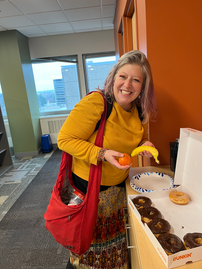LTWLA Participates In Mental Health First Aid Training
- Lead The Way
- Mar 8, 2024
- 2 min read
Friday, March 8, 2024

LTWLA was fortunate to participate in a Youth Mental Health First Aid (MHFA) training course with National Council For Mental Wellbeing. The trainers were Amanda Hampton and Tyrrea Bryd, who dove into the ins and outs of recognizing mental health signs and symptoms in youth. They gave us the knowledge to distinguish between an observable sign of mental health issues versus non-observable symptoms. They discussed the ALGEE Action Plan as an interceptive non-linear interference strategy to assist youth when shown signs of mental health or in a crisis.
ALGEE stands for:
Assess for risk of suicide or harm
Listen nonjudgmentally
Give reassurance and information to resources in community
Encourage professional help
Encourage self help and supportive wellbeing strategies

Many factors can influence youth development from biological, psychological, familial, social, and cultural. Becoming a certified First Aider and helping youth navigate the impacts of mental health and/or substance abuse, is a responsibility that all mentors and adults in youth development are compelled to do. Cultivating a safe, nonjudgmental environment for youth to feel encouraged and promoted to build resilience to the impact of traumatic experience is an entrusted obligation. In addition to prioritizing career coaching and preparing youth for successful entry into the workforce and post-secondary education, it's crucial to impart essential life skills to effectively manage this transition.
The MHFA training also taught us the 8 steps in the Self Care Action Plan to encourage youth to advocate for themselves and prioritize self care:
Intellectual Wellness
Emotional Wellness
Environmental Wellness
Physical Wellness
Spiritual Wellness
Financial Wellness
Social Wellness
Occupational Wellness
Thank you to the National Council For Mental Wellbeing and please check out their website for more information: https://www.thenationalcouncil.org/














टिप्पणियां